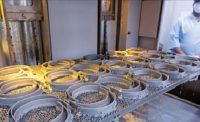Prostate cancer is the second most common cancer in North America and the leading type of cancer found in males. Each year approximately 1.5 million core-needle biopsies are performed, leading to about 220,000 newly diagnosed cases of prostate cancer.
Recently, a team of researchers from the Worcester Polytechnic Institute developed a 3-tesla magnetic resonance imag-ing (MRI) machine featuring a teleoperated robot that improves the way prostate cancer is detected and treated. Operated from a remote location, the robot is specifically designed for prostate procedures that puncture the skin and take place under MRI guidance.
The robot features a high-resolution fiber optic sensor (with real-time steering capability) and a three-axis Cartesian module that positions a three-axis needle driver. DryLin T linear guides, made and donated by igus Inc., facilitate translational motion of the Cartesian module. The driver enables the rotation and translational movement of the needle cannula, which is a flexible tube inserted into the patient’s body cavity for MRI-guided diagnosis and therapy.
The driver has a needle guide sleeve, a collet locking mechanism and a passive optical tracking fiducial frame. Two iglide A200 plastic plain bearings (also made
and donated by igus) are used in the front and rear of the driver to constrain the needle guide sleeve.
The bearings enable the robot’s motor to rotate the needle using the collet mechanism by way of a timing belt. The rotating needle reduces tissue damage while enhancing target accuracy. An additional 10 bearings are used to create a hinge joint and provide single-axis rotation.
Because the robot operates inside a closed-bore MRI machine with only a 500-millimeter cylinder diameter, com-ponents of the robot’s mechanical system must be compact. They also have to be nonferrous for the patient’s safety during the radiation process. For these reasons, the Institute selected the DryLin T guides and A200 bearings.
DryLin T guides are comprised of hard-anodized aluminum rails and carriages, and plastic sliding elements that do not interfere with the MRI procedure. The guides are self-lubricating and eliminate the need to apply messy lubrication, which is prohibited in a sterile medical environment. They also feature a low profile for applications where installation space is an issue.
The DryLin T guides can be used in harsh applications because they resist contaminants, humidity and moisture. Alt-hough lightweight, the guides have high-shock absorption capabilities and operate quietly at high speeds and accelerations. DryLin T guides are available in 15-, 20-, 25- and 30-millimeter sizes, and are dimensionally interchangeable with industry-standard linear ball guides.
The A200 bearings are comprised of FDA-compliant polymers specifically designed for applications involving contact with drugs or food. They operate dry to prevent contamination, and can reach maximum speeds of 0.8 meter per second (rotating) and 2 meters per second (linear). The bearings offer high resistance to abrasion, dirt, cleaning agents, fats, oils, alkalis and weak acids, and have a deformation of less than 2 percent.
For more information on linear guides and bearings, call 800-521-2747 or visit www.igus.com.
Rails, Bearings Position Robot to Better Fight Cancer

Worcester Polytechnic Institute researchers have developed a magnetic resonance imaging machine featuring a teleoperated robot that improves the way prostate cancer is detected and treated. Photo courtesy Worcester Polytechnic Institute

